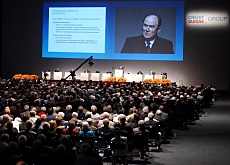May 1 offers brief respite for unions

The co-president of Switzerland’s largest trade union says social inequalities have increased since the Right’s gains in the 2003 parliamentary elections.
In an interview with swissinfo, Unia’s Vasco Pedrina says the widening wage gap between managers and workers is aggravating tensions between employers and trade unions.
Unia was founded last October from the merger of four trade unions, and has 200,000 members, working in several industries. It represents the interests of one million workers and is a partner in roughly 500 collective labour agreements.
swissinfo: You have been making speeches to mark May 1 for 20 years. Does this day still have the same resonance for you?
Vasco Pedrina: May 1 is still the day when everyone stands up for the values of solidarity, social justice, freedom and, last but not least, peace. These are, and always have been, the pillars of the labour movement and trades-union activism.
For those who take part – and for people like me who get up and make speeches on May 1 – it is above all a day to reflect and take stock. But it is also a time to recharge one’s batteries before engaging in new social battles.
swissinfo: Speaking of battles, in recent months there seem to have been greater tensions between unions and employers. Are you also aware of this in the course of your daily work?
V.P.: Unfortunately, yes. And it is, among other things, a consequence of the shift to the Right which occurred over a year ago in the Swiss parliament and federal government. In the employers’ associations, we sense an increasingly ideological current connected with the policies of the [rightwing] Swiss People’s Party, but also among employers’ think tanks, such as Avenir Suisse.
And another factor aggravating the tensions is undoubtedly the cost-cutting policy being pursued on all fronts by the public authorities, which is leading to job losses. As well as creating unemployment and further social inequalities, this policy is putting the brakes on consumption and therefore preventing economic recovery.
swissinfo: While the federal government is cutting jobs, the private sector is having little success in creating new ones. Yet in 2004 profits at the major Swiss companies were growing and, in some cases, were better than ever.
V.P.: We should be scandalised by this. The current neo-liberal policy – which has also spread to the services sector, such as banks and insurance companies – is widening the gap between the majority of wage earners, whose purchasing power has been steadily eroded, and the managerial class. Managers are enriching themselves and have abandoned all moral scruples, even here in Switzerland.
While managers’ incomes are growing, we are also seeing a rise in the number of people who can barely survive until the end of the month. The first of May is also an opportunity to appeal for a change in direction. This is essential if we want to see a return to consensus between the social partners and the development of a civilised, democratic society.
swissinfo: For some time the growth rate of the Swiss economy has been very weak. What are the unions’ proposals for getting the economy back on track?
V.P.: For some years, the export sector has been doing well, while the domestic economy has been in trouble. The best way to get the economy moving again is therefore to encourage consumption. We need to increase the purchasing power of wage earners, and achieve a fairer sharing out of the economic pie.
At the same time, we would like to see the state investing in sectors which hold promise for the future. The combination of these two factors, together with sound monetary policy, would bring about an improvement in Switzerland’s economic growth rate.
swissinfo: Swiss enterprises are not only exporting; increasingly, they are outsourcing their manufacturing to low-wage countries. Are you worried by this tendency?
V.P.: Outsourcing is not a major problem, provided companies are also able to innovate and develop new products and services here in Switzerland. This is true, for instance, of the pharmaceuticals industry, which has opened new factories abroad but is also maintaining high levels of production in Switzerland.
For Switzerland, it is important to concentrate on producing goods and services with high added value. And therefore it is essential to have a well-qualified, motivated workforce – a workforce that is treated properly in terms of working conditions, because this is the only way to maintain a high level of motivation.
swissinfo: One issue that most concerns the unions is the plan to extend an agreement on the free movement of labour to the ten new European Union member states. Are the measures adopted by the Swiss parliament sufficient to prevent wage dumping?
V.P.: The so-called supporting measures are a major step forward. They have been extracted, after a hard struggle, from a parliament that is increasingly insensitive to social problems. However, a number of issues remain unresolved. First of all, these measures also need to be implemented by the cantonal governments. And, in some cantons, it looks as if there will be a hard struggle ahead.
In addition, the supporting measures will only be effective if they are properly underpinned by robust collective labour agreements, to prevent, among other things, wage dumping. We are somewhat concerned to note that, in some sectors, such as the construction industry, employers are actually trying to weaken the existing contractual arrangements. If this continues, we would have great difficulty persuading our members to vote in favour of greater openness to the EU.
swissinfo-interview: Armando Mombelli
Born in 1950 in Ticino, Vasco Pedrina attended studied political economy at Fribourg University.
Active in the union movement since the 1980s, for many years Pedrina led the GBI union (building and allied trades).
Since 2005, he has been co-president of Unia, together with Renzo Ambrosetti, also from Ticino.

In compliance with the JTI standards
More: SWI swissinfo.ch certified by the Journalism Trust Initiative




You can find an overview of ongoing debates with our journalists here. Please join us!
If you want to start a conversation about a topic raised in this article or want to report factual errors, email us at english@swissinfo.ch.